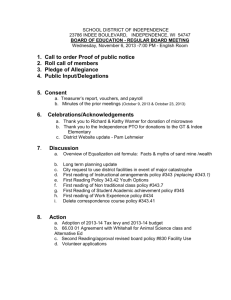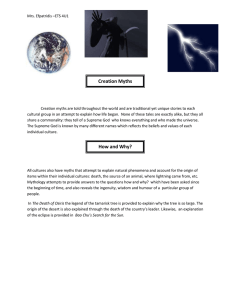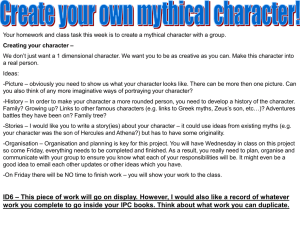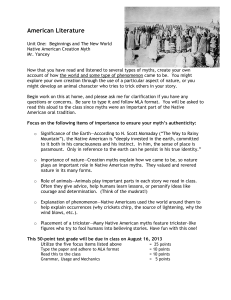Mythology Notes
advertisement
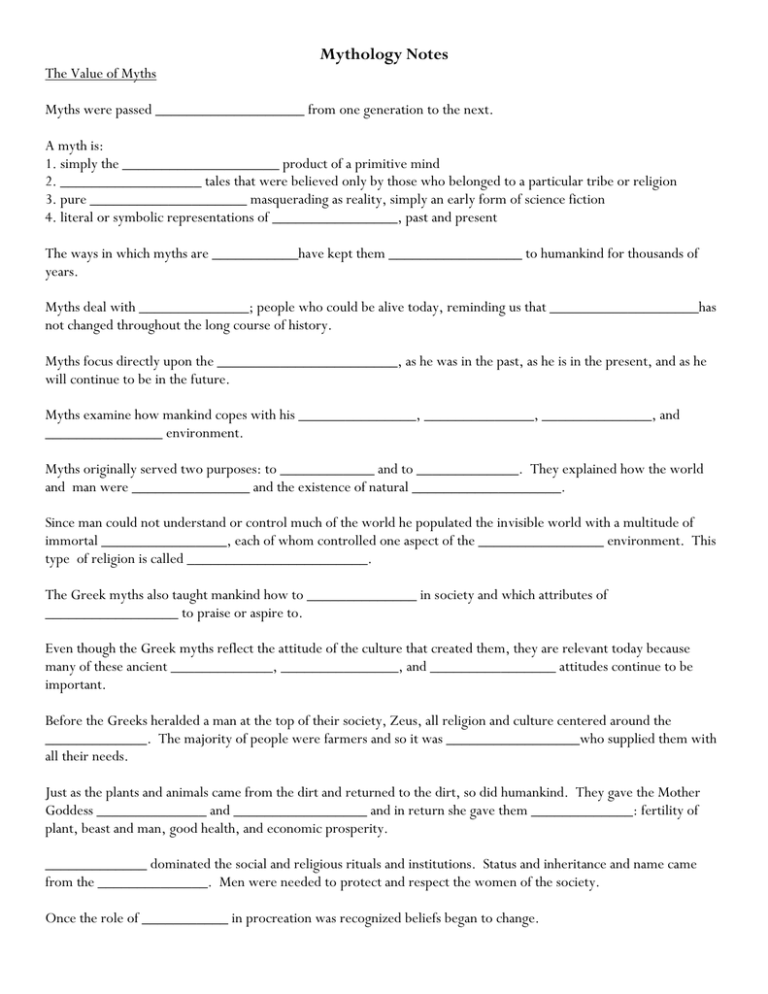
Mythology Notes The Value of Myths Myths were passed ___________________ from one generation to the next. A myth is: 1. simply the ____________________ product of a primitive mind 2. __________________ tales that were believed only by those who belonged to a particular tribe or religion 3. pure ____________________ masquerading as reality, simply an early form of science fiction 4. literal or symbolic representations of ________________, past and present The ways in which myths are ___________have kept them _________________ to humankind for thousands of years. Myths deal with ______________; people who could be alive today, reminding us that ___________________has not changed throughout the long course of history. Myths focus directly upon the _______________________, as he was in the past, as he is in the present, and as he will continue to be in the future. Myths examine how mankind copes with his _______________, ______________, ______________, and _______________ environment. Myths originally served two purposes: to ____________ and to _____________. They explained how the world and man were _______________ and the existence of natural ___________________. Since man could not understand or control much of the world he populated the invisible world with a multitude of immortal ________________, each of whom controlled one aspect of the ________________ environment. This type of religion is called _______________________. The Greek myths also taught mankind how to ______________ in society and which attributes of _________________ to praise or aspire to. Even though the Greek myths reflect the attitude of the culture that created them, they are relevant today because many of these ancient _____________, _______________, and ________________ attitudes continue to be important. Before the Greeks heralded a man at the top of their society, Zeus, all religion and culture centered around the _____________. The majority of people were farmers and so it was _________________who supplied them with all their needs. Just as the plants and animals came from the dirt and returned to the dirt, so did humankind. They gave the Mother Goddess ______________ and _________________ and in return she gave them _____________: fertility of plant, beast and man, good health, and economic prosperity. _____________ dominated the social and religious rituals and institutions. Status and inheritance and name came from the ______________. Men were needed to protect and respect the women of the society. Once the role of ___________ in procreation was recognized beliefs began to change. Mythology The Value of Myths Myths were passed orally from one generation to the next. A myth is: 1. simply the imaginative product of a primitive mind 2. sacred tales that were believed only by those who belonged to a particular tribe or religion 3. pure fantasy masquerading as reality, simply an early form of science fiction 4. literal or symbolic representations of reality, past and present The ways in which myths are real have kept them meaningful to humankind for thousands of years. Myths deal with people; people who could be alive today, reminding us that human nature has not changed throughout the long course of history. Myths focus directly upon the nature of man, as he was in the past, as he is in the present, and as he will continue to be in the future. Myths examine how mankind copes with his physical, social, religious, and political environment. Myths originally served two purposes: to explain and to teach. They explained how the world and man were created and the existence of natural phenomena. Since man could not understand or control much of the world he populated the invisible world with a multitude of immortal deities, each of whom controlled one aspect of the natural environment. This type of religion is called polytheistic. The Greek myths also taught mankind how to behave in society and which attributes of character to praise or aspire to. Even though the Greek myths reflect the attitude of the culture that created them, they are relevant today because many of these ancient social, ethical, and religious attitudes continue to be important. Before the Greeks heralded a man at the top of their society, Zeus, all religion and culture centered around the female. The majority of people were farmers and so it was Mother Earth who supplied them with all their needs. Just as the plants and animals came from the dirt and returned to the dirt, so did humankind. They gave the Mother Goddess prayers and offerings and in return she gave them blessings: fertility of plant, beast and man, good health, and economic prosperity. Women dominated the social and religious rituals and institutions. Status and inheritance and name came from the mother. Men were needed to protect and respect the women of the society. Once the role of men in procreation was recognized beliefs began to change.
